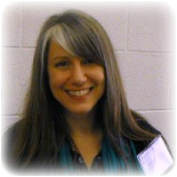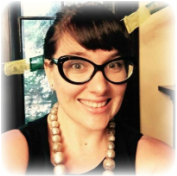Underman: Your book, Saving Face: Disfigurement and the Politics of Appearance, recently won the Body and Embodiment Section’s Best Publication Award. Congratulations! In your book, you draw together data from four sites of research. How did you select these cases and what was it like bringing them together in your analysis of the “disfigurement imaginary”? Do you have any advice for sociologists studying the body and embodiment about selecting methodological approaches?
HLT: Thank you! I’m so glad that the book seems to be contributing to a broader conversation about ableism and inequalities. The project began as a classic chronicle of an emerging biotechnology--face transplantation. But over time I realized I was less interested in the bioethical implications of face transplantation and more interested in questions about how appearance functions like a privilege and an inequality. In order to unpack societal reactions to facial difference, specifically within the medical industrial complex, I wanted to incorporate a wide range of experiences that are diagnosed as atypical. The book includes chapters on face transplantation, the reality television show Extreme Makeover, facial feminization surgery, and the medical charity Operation Smile. From my perspective, sociologists should be more beholden to a vision of public sociology than ever before. So we should strive for methodological integrity, but we also need to craft projects that are compelling to wide-ranging audiences and that intervene in the problems of our times. That’s a different methodological North Star than I was trained to work towards, but given the decline of higher education as a viable career path and the fragility of our discipline, that’s the advice I’d emphasize to emerging sociologists.
Underman: As a feminist researcher, you had to grapple with how to write about what is socially deemed as ‘facial disfigurement’ without falling back on ableist narratives. What was this process like? How do you address the issue of impairment?
HLT: I continue to struggle with precisely this conundrum. How do we describe societal patterns without implicitly affirming underlying narratives. For example, in Saving Face I describe transphobic ways that surgeons interact with transwomen. Some readers have mistaken my data for my analysis. In other words, some attribute the doctor’s ways of understanding trans embodiment to me. This might reveal a flaw in the construction of the chapter or in the writing, but I also think it is a problem intrinsic to sociology. Here’s a question I think about--how do we describe white supremacy without invoking racist tropes or asserting the painful legacy of systemic racism? Carefully. But I also think we’re kidding ourselves if we don’t acknowledge that the very project of describing and unpacking inequalities is often symbolically violent. It’s triggering to students. It’s incomplete and oversimplified. It’s inherently an insufficient intervention in the real harms people experience everyday.
Underman: Your work often appears in outlets like The Huffington Post, Feminist Wire, and other online or popular press platforms. How do you engage with public sociology in these contexts? How is writing a political act for you? How have you been able to transform your skills into your coaching work? What advice would you give academics who want to start writing for a broader audience?
HLT: As this Presidential election reveals, we find ourselves navigating a deep-seated anti-intellectualism. And yet, we need analysis, and we need that analysis to be digestible and comprehensible. We need viral analysis. We need useful sociology. If we can bring the sociological imagination to audiences as a tool for understanding their lives, our economic climate, intensifying militarism, and injustice, we’ve done political work. One thing I’m really disappointed in is the lack of innovative responses from graduate training programs to help empower students to bring their sociological skills to bear outside of academia. In my work with nonprofits, business ventures, and individuals, I am constantly in awe of how useful sociology is. We’re good thinkers and quick learners. I’ve used sociology to help marketing teams think about how to advertise face wash to teenage girls without relying on lookism, to develop strategic messaging to funders of nonprofits, and to train leaders to cultivate work cultures that combat staff burnout. I’d love to see faculty use their institutional security, to leverage their work, to do sociology in collaboration with nonprofit and for profit ventures. It’s not viable, and maybe not even ethical, to remain bound to the academy because our job is in some way, shape, or form to train students--students who won’t have the luxury to live academic lives. When we’re trying to interact with broader audiences, one question to start with is “What problem can I solve?” Then, get to the solving.
Underman: Given that your work focuses on the politics of appearance and the central importance of the face, how do you see these processes playing out in virtual/online spaces? How do you see the relationship between social media and visibility/invisibility? Where do you see projects like #HospitalGlam and other disability selfie campaigns fitting into these dynamics?
HLT: I think it’s pretty clear that social media amplifies the significance of appearance. Just consider how long it took for all of us to learn to take pictures at a side angle from above. We have literally cultivated an embodied habitus that influences the reaction our online appearance generates. So while social media may be a route through which previously invisible experiences are made visible (like on the #HospitalGlam Tumblr page), when appearance is a primary vector through which people achieve status, we’re feeding ageism, ableism, lookism, classism, and fat phobia. Widening standards is an inadequate solution because we simply generate new hierarchies. The fact is that combatting our implicit biases related to appearance is central to projects of social justice. We have to learn to care about and notice appearance less.
Underman: Can you tell us a little bit about your new project, “Self-Care for World Changers”?
HLT: I am in the midst of interviewing folks that work as world-changers (broadly defined)--people who are caregivers, who endeavor to make the world a more just place, who labor for equity and inclusion. I’m talking to them about burnout, toxic work cultures, and real self care (the kind that actually impacts our well being). There’s some writing that will come from this project, but I’m also using it to inform my work with clients. We know about the harms of overworking and the ways the glorification of busyness undermines morale. We know that many workplaces (academia included) demand that employees remain silent about really unhealthy dynamics. But in this context (which is part and parcel to late capitalism as sociologists well know), what kind of agency can individuals exert to transform the quality of our lives? I’m talking to folks whose lived experience has given them a kind of expertise about how to flourish in very hard circumstances. Like any good sociological project, it’s evolving.


 RSS Feed
RSS Feed
